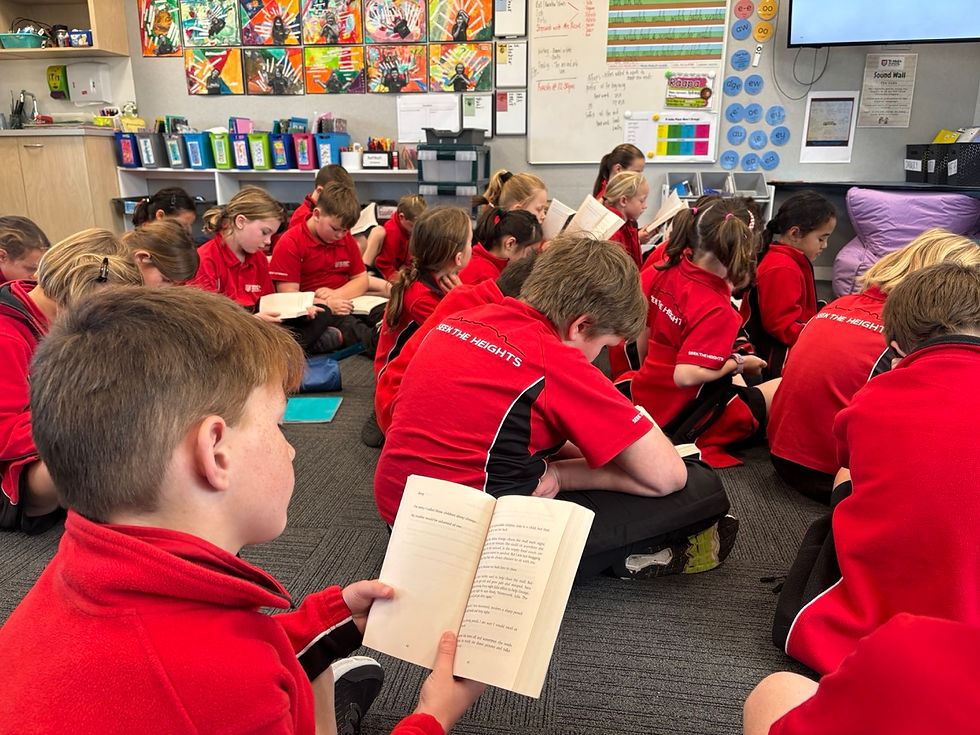How Te Mata School Builds Reading Fluency for Thriving Learners
- Aug 9, 2025
- 4 min read
What if fluent reading was the key to unlocking your child’s confidence, comprehension, and love of learning?

At Te Mata School, we are deeply committed to building strong reading fluency in every student because fluent readers are confident learners. Fluency isn’t just about reading faster, it’s about reading with accuracy, natural pace, automaticity and expression, all of which are essential for making meaning from text. It’s the stepping stone between sounding out words and deeply understanding them. That’s why fluency is a key focus across all levels of our school, from the first few months in a new entrant classroom through to our Year 6 leaders.
We follow a structured literacy approach, fully aligned with the New Zealand Curriculum refresh. Phase One of the curriculum outlines that within the first 6 months of school, students should be reading simple words quickly using learned grapheme-phoneme knowledge. By the end of Year 1, they are expected to read decodable texts with accuracy and phrasing. From Year 2 onwards, students are reading year-level texts with expression and at fluency rates appropriate for their age. By the end of Year 6, children are expected to read smoothly and expressively, clearly showing they understand the meaning of what they read.
To track progress, we use a range of assessments. These include:
Oral Reading Fluency (ORF) assessments, which allow us to monitor a student’s speed, accuracy, and expression, and help identify those who may need more targeted support.
Nonword Fluency (NWF) assessments, used particularly in the first four years of school to check how confidently students can decode unfamiliar words using their phonics knowledge.
Fluency is built through practice — and that practice must be purposeful, consistent, and evidence-based. At Te Mata School, we are continuing to strengthen our approach as we grow our shared understanding of what best practice looks like.

As you walk past our classrooms, you might hear or see some of the following in action:
Modelling fluent reading, with teachers reading aloud using rich phrasing, pace, and expression.
Echo reading, where students repeat after the teacher to build confidence and accuracy.
Choral reading, with voices rising together in rhythm as the class reads in unison.
Partner reading, as children take turns reading aloud and supporting each other.
Repeated reading, where students revisit the same text to improve fluency and flow.
Fluency and reading buddies, with students reading aloud from fluency-based texts and giving each other encouragement.
These small, powerful moments are part of our collective journey helping every child grow as a fluent, expressive and confident reader.

And of course, we give students lots of chances to read real books, not just readers and online sources. Our literacy blocks are rich with opportunities to explore stories, poems, non-fiction and novels that both challenge and excite our learners.
In Years 3 and 4, children begin to encounter more complex texts including longer sentences, subject-specific vocabulary and more sophisticated language structures. This is where fluency skills truly start to shine. Students are immersed in shared novel experiences that spark conversation and deepen understanding. Whether exploring 'Charlie and the Chocolate Factory' or diving into a topical non-fiction article our learners practice reading aloud, unpacking vocabulary and supporting each other with tricky sections of text. Regular sessions with fluency buddies give students the chance to build confidence and expression in their oral reading. For those needing extra support, our Tier Two Intervention programmes provide focused teaching in small groups, strengthening decoding skills without limiting access to the rich ideas and content of year-level texts.

In our Senior school, student voice has shaped and strengthened our literacy practices. Many students tell us they love having a buddy to read with, someone who helps them practise fluency, correct errors kindly and celebrate progress. One student shared, “I love that we have reading buddies, so we have someone to correct us if we’re wrong and need help!” Another added, “Reading with my buddy helps me be brave to try harder words.”
We also hear from students how much they enjoy our whole-class novel studies, which have included 'War Horse', 'The Last Bear' and 'Holes'. These texts are explored together with rich discussion, expressive read-alouds and follow-up creative or critical thinking activities. The novel studies provide us with an authentic context for explicitly teaching vocabulary. One student said, “I love when we read novels together as a class. It makes it more fun and I understand more.” Another reflected, “I like doing stuff in a big group, I learn more when we talk about the book all together.”
This article is shared with permission from Te Mata School and reflects their ongoing commitment to building confident, thriving readers.


Comments